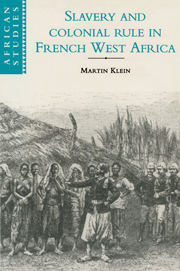Book contents
- Frontmatter
- Contents
- List of illustrations
- List of maps
- List of tables
- Preface
- List of abbreviations
- Glossary
- 1 Slavery in the Western Sudan
- 2 Abolition and retreat. Senegal 1848–1876
- 3 Slavery, slave-trading and social revolution
- 4 Senegal after Brière
- 5 Conquest of the Sudan: Desbordes to Archinard
- 6 Senegal in the 1890s
- 7 The end of the conquest
- 8 The imposition of metropolitan priorities on slavery
- 9 With smoke and mirrors: slavery and the conquest of Guinea
- 10 The Banamba Exodus
- 11 French fears and the limits to an emancipation policy
- 12 Looking for the tracks. How they did it
- 13 After the War: renegotiating social relations
- 14 A question of honor
- Appendixes
- Notes
- Bibliography
- Index
- Titles in the series
8 - The imposition of metropolitan priorities on slavery
Published online by Cambridge University Press: 07 May 2010
- Frontmatter
- Contents
- List of illustrations
- List of maps
- List of tables
- Preface
- List of abbreviations
- Glossary
- 1 Slavery in the Western Sudan
- 2 Abolition and retreat. Senegal 1848–1876
- 3 Slavery, slave-trading and social revolution
- 4 Senegal after Brière
- 5 Conquest of the Sudan: Desbordes to Archinard
- 6 Senegal in the 1890s
- 7 The end of the conquest
- 8 The imposition of metropolitan priorities on slavery
- 9 With smoke and mirrors: slavery and the conquest of Guinea
- 10 The Banamba Exodus
- 11 French fears and the limits to an emancipation policy
- 12 Looking for the tracks. How they did it
- 13 After the War: renegotiating social relations
- 14 A question of honor
- Appendixes
- Notes
- Bibliography
- Index
- Titles in the series
Summary
… the status of captivity should be recognized neither by administrative authority nor by judicial, neither in civil matters nor in penal matters; any attempt on the liberty of the individual should be vigorously prosecuted.
Instructions of Governor-General RoumeUnder Ponty, Haut-Sénégal-Niger moved more quickly on slavery than any other colony. Ponty had spent most of his short career in the Sudan, serving at one time as Archinard's secretary. He took from his Sudanese experience a concern to liberate ordinary Africans from the oppressiveness of traditional rulers and “barbaric” custom. His commitment to liberty was, however, strongly tempered by caution and a pragmatic streak. Ponty could be absolutely ruthless when he had to be, as, for example, while trying to extend the railroad into Bamako during a period of famine. He clearly saw, however, that economic growth required both an end to the slave trade and the creation of a more mobile labor force. Equally important, he took office at a time when pressure was being placed on the colonial administration from Paris. He knew when to appeal to Republican principle and when to appeal to colonial paternalism. He could be cautious and he could be daring, but he had a clear view of metropolitan priorities and African necessities.
Albert Decrais and Ponty's first steps
On 11 December 1899, Abbe Lemire, a Catholic deputy, rose in the Chamber to speak on family questions in the colony. A large part of Lemire's speech dealt with the persistence of the slave trade, and in particular the trade in women.
- Type
- Chapter
- Information
- Slavery and Colonial Rule in French West Africa , pp. 126 - 140Publisher: Cambridge University PressPrint publication year: 1998

